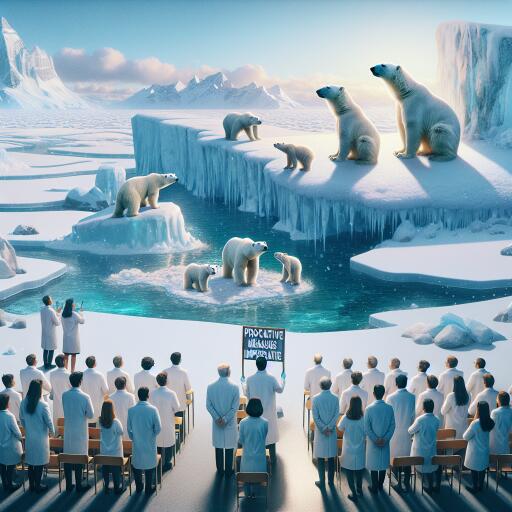
Experts issue dire warning about the future of polar bears in the Hudson Bay: ‘Proactive measures are imperative’
In the vast, icy expanse of Canada’s Hudson Bay, polar bears—a key apex predator instrumental in maintaining the ecological equilibrium of their habitat—are facing an uncertain future. Recent findings signal a distressing forecast for the polar bear populations residing in this region, with climate change marked as a pivotal force driving their potential demise.
New scientific inquiries into the environmental transformations affecting Hudson Bay reveal a grim prognosis for its polar bear inhabitants. Research published in the journal Communications Earth & Environment highlights the alarming trend of increasing ice-free durations in Hudson Bay, a consequence of escalating global temperatures. This phenomenon diminishes the polar bears’ capacity to hunt and access their primary food source, seals, which rest on the ice’s surface. The projection suggests a dire scenario: certain polar bear groups may face extinction between 2030 and 2060 due to the exacerbated struggle to find food.
The significance of polar bears extends beyond their role in the Arctic ecosystem. As iconic symbols deeply intertwined with the cultural heritage of Arctic communities, they also signify the health of the Arctic environment—a critical zone that provides sustenance for millions worldwide through its fish resources. Protecting these creatures and their habitat, thus, benefits not only the immediate ecology but humanity at large.
Yet, the challenges confronting polar bears are manifold. Beyond the threats posed by a warming planet, pollution poses a significant risk. Research involving Alaska’s polar bears uncovered disturbing evidences, such as the presence of plastics in the stomach content of some bears, reflecting the pervasive reach of global pollution. Furthermore, a recent case saw a polar bear falling victim to avian influenza, marking a concerning precedent for the species.
The call to action by researchers underscoring these findings is clear: “Proactive measures are imperative.” Mitigating global warming to a 2-degree Celsius increase above pre-industrial levels may offer a lifeline to numerous polar bear groups. However, for those in Hudson Bay, the southernmost edge of their range, time may already be running short.
Amid these alarming signals, the discourse shifts towards the pivotal role of sustainable practices and clean energy in staving off further temperature increases. Inspiring examples of such initiatives include a collective of rural Virginia towns transitioning towards clean energy, creating over a million jobs and distancing themselves from coal reliance. Furthermore, significant religious institutions, such as the Presbyterian Church, have begun divesting from fossil fuels, showcasing a broad commitment to combat climate change.
Individual actions also hold power in altering the course of this crisis. Simple adjustments in daily routines, such as opting for cold water during laundry, can not only contribute to energy conservation but also offer financial savings. The disconnection of unused appliances presents another easy yet effective strategy to reduce electricity consumption and, subsequently, the environmental footprint.
As the plight of Hudson Bay’s polar bears unfolds, it becomes increasingly clear that collaborative efforts spanning global, communal, and individual scales are crucial in forging a path towards a sustainable future. The preservation of these majestic creatures, and by extension our planet, rests upon the immediacy and effectiveness of our actions today.





Leave a Reply